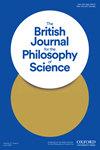语言学哲学
IF 3.2
1区 哲学
Q1 HISTORY & PHILOSOPHY OF SCIENCE
British Journal for the Philosophy of Science
Pub Date : 2018-07-19
DOI:10.1093/OSO/9780190690649.003.0017
引用次数: 1
摘要
本章是对语言学的目标和方法的探讨,目的是了解这一学科的具体情况以及语言学家对其领域的方法论和科学哲学一般原则之间的关系。第一部分强调语言学是对语言的研究,而不是对语言的研究。第二部分描述了从结构语言学到生成语法的转变,这是一种范式转变,涉及研究内容和研究方式的重大变化。下一节侧重于当代语言学的经验意义,讨论解释和预测的标准,以及语言学假设的确认和反驳。最后一部分介绍了语言共性,它们是什么以及如何识别和解释它们,从而明确了与理解语言多样性和语言能力的目标的联系。本文章由计算机程序翻译,如有差异,请以英文原文为准。
Philosophy of Linguistics
This chapter is an enquiry into the goals and methods of linguistics, with the aim of understanding both the specifics of the discipline and the relationships between linguists’ take on the methodology of their field and general principles of philosophy of science. The first part highlights linguistics as an inquiry into language, as opposed to languages. The second part describes the shift from structural linguistics to generative grammar as a paradigm shift, involving major changes in both what is studied and how it is studied. The next section focuses on the empirical import of contemporary linguistics, discussing standards of explanation and prediction, as well as confirmation and refutation of linguistic hypotheses. The last part introduces linguistic universals, what they are and how they may be identified and explained, thus making explicit the connection with the goal of understanding not only the variety of languages but the faculty of language.
求助全文
通过发布文献求助,成功后即可免费获取论文全文。
去求助
来源期刊

British Journal for the Philosophy of Science
管理科学-科学史与科学哲学
CiteScore
6.00
自引率
0.00%
发文量
50
审稿时长
>12 weeks
期刊介绍:
The British Journal for the Philosophy of Science encourages the application of philosophical techniques to issues raised by the natural and human sciences. These include general questions of scientific knowledge and objectivity, as well as more particular problems arising within specific disciplines.
Topics currently being discussed in the journal include: causation, the logic of natural selection, the interpretation of quantum mechanics, the direction of time, probability, confirmation, foundations of mathematics, supertasks and the theory of emotion.
 求助内容:
求助内容: 应助结果提醒方式:
应助结果提醒方式:


